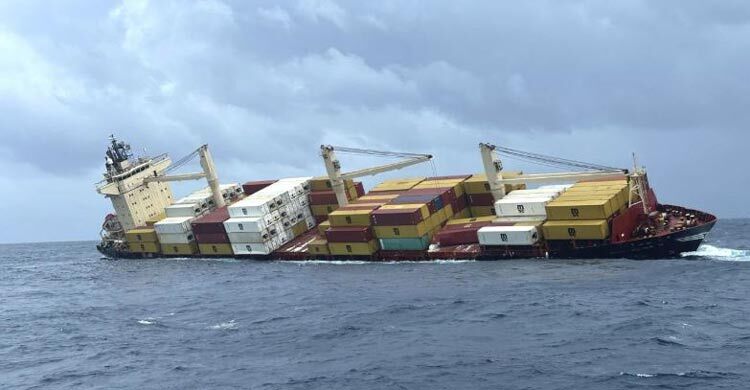KOCHI, India — Authorities in southern India’s Kerala state have issued a coastal alert after a Liberian-flagged cargo ship carrying oil and hazardous chemicals capsized and sank off the coast near Kochi on Sunday, triggering fears of an environmental disaster in one of the country’s most ecologically sensitive and tourist-rich regions.

The vessel was carrying 640 containers, including 13 with hazardous cargo and 12 containing calcium carbide, a chemical that reacts with seawater to release flammable acetylene gas. According to the Indian Coast Guard, the ship also had over 450 metric tonnes of fuel onboard — including 84.44 metric tonnes of diesel and 367.1 metric tonnes of furnace oil — raising serious concerns about the potential impact on marine ecosystems and coastal communities.
Although all 24 crew members were safely rescued in a high-risk operation coordinated by the Indian Navy, several containers were reported to be adrift and drifting toward the coastline, prompting precautionary evacuations in areas near the spill site.
Officials have warned that leaking oil, fuel, and chemicals pose a serious health hazard to local residents and could deal a devastating blow to marine biodiversity. The stretch of coast near Kochi is known for its fragile marine life, thriving fisheries, and significance as a hub for eco-tourism.
“The situation is under close watch,” a senior Kerala disaster management official said, adding that response teams have been deployed to assess the damage and begin containment operations. Hazardous material response units and marine pollution specialists are also being mobilized.
As the drifting containers near shore, authorities fear additional risks from explosions or toxic leaks, particularly from calcium carbide, which reacts explosively in wet conditions.
The incident comes amid heightened concerns about maritime safety in the Arabian Sea, with environmentalists urging immediate steps to strengthen shipping regulations and emergency response capabilities along India’s vulnerable coastal zones.



